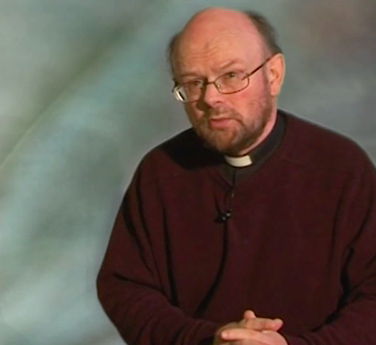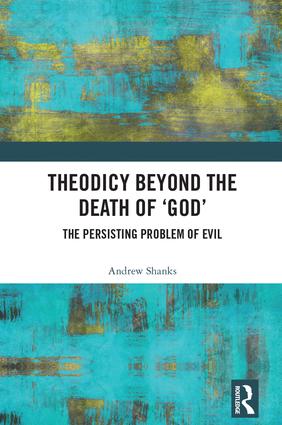'Theodicy Beyond the Death of God': Church decline and the 'evangelistic impatience'
One autumn day in 2004 there was a knock at the door. A Hasidic-looking man wearing a cap smiled benevolently and asked for Dr Lancaster. 'That's me,' I said. 'Hi,' he said.
'I'm the new Canon Theologian at Manchester Cathedral and I understand from my predecessor that you know a great deal about Jewish mysticism.'
We never looked back.
Andrew went on to praise, in his earlier book, Hegel versus 'Interfaith Dialogue', the Broughton Park Dialogue Group, which he and I had co-founded.
His latest book is called Theodicy Beyond the Death of 'God' and he has invited me to review it because of its potential not only for the Church's renewal but for a rethinking of what the Church has to learn from dialogue with Jews.

Andrew's former teacher, Rowan Williams, has said: 'My view is still that Andrew is the most really distinguished mind in the C of E, and I owe him a lot.'
This book certainly bears out Rowan's assessment of Andrew as an exceptional thinker.
According to Andrew, the current affliction and 'original sin' of the contemporary Church of England is its 'evangelistic impatience'. What should interest theologians is 'love of truth'. The current Church is 'corrupted by collusion with such impatience'. For this to be remedied, according to Andrew, 'theology and mission should be in tension.'
Andrew himself was ordained in 1980 and 'ever since, the Church has declined in membership and become the panicky Church which no longer knows what it is for. It is full of rampaging evangelistic impatience.'
Andrew criticizes three main areas of Christian engagement since 1980: homogeneousness, crude dogmatic certainty and magnifying the power of G-d.
For Jesus, who was Jewish (amazing how often this fact is left out of the equation) G-d is a verb and can only be known negatively. The great Maimonides (1135-1204) emphasises this fact. We can only know what G-d is not – s/he is not a potentate wearing a mitre, but the humble voice of dissidence and humility.
Andrew is in favour of diversity – also a very Jewish approach - and he is against 'mega churches'.

Andrew prefers 'truth-as-openness' to 'truth-as-correctness' and invites us to compare the 'genuine saint' with the 'devout psychopath'. The psychopath may be learned and sophisticated but the saint is open to others, not out to deceive and flatter.
With 'truth-as-openness', according to Andrew, G-d cannot be 'almighty' – i.e., seeking fame, power or career, but searches instead after meaning in life.
The Gospel is 'missold through evangelistic impatience. Faith is about truth-as-openness and the overcoming of resentment.'
And here I would add that that is what Holocaust survivors have done. Being murdered by Nazis and their aiders and abettors in Eastern Europe, they picked themselves up, and started building – rebuilding, and especially in their ancient homeland of Israel.
Many survivors whose entire families had been burned in the gas chambers built hospitals instead of demanding restitution for their stolen homes and lands in Europe. These survivors looked forward, not back. This state of mind is what Andrew is advocating for Christians.
As for those ever-increasing 'secularists' who don't believe in G-d, Andrew describes these as 'clinging onto resentment'. For Andrew, theodicy is the 'vindicated G-d'. Creation, and especially the 'formless and void' of Genesis 1, contain the possibility of evil but also the possibility of overcoming evil.
Creation creates another space, but does not remove the 'abyss' which we also encounter in Genesis 1.
There is therefore a constant embattlement with truth.
Andrew finds the true definition of a saint in Isaiah 40-55, in the 'suffering servant' passages. The Kingdom of Judah has been exiled to Babylon. And Jerusalem, the Jewish capital, has been destroyed. Why should people worship G-d if He lets His people suffer?
Fast forward to the 20th century, this is also what people also asked in the death camps. Inmates of Auschwitz and Belsen put G-d on trial, found Him guilty, but still continued to worship Him and carry out the mitzvot in the camps – as best as they could.
For Andrew, the originality of Isaiah lies in the authentication of G-d by the suffering of His people. It is suffering which makes us saints.
When G-d creates the world, he 'shrinks' (this is the concept known in Kabbalah as tzimtzum – contraction).
Creation is therefore a form of shrinkage, not of expansion.
Evangelistic impatience denies shrinkage and instead stresses 'miracles'.
By shrinking however we are able to open ourselves up in empathy with our neighbours. 'Truth- as-correctness' does not save us. To be saved is to be opened up. Monotheisms generally suffer from being 'correct'.
Simply increasing congregations is not a positive step. Diversity is positive. Feeling at home in a congregation is a negative outcome. A person should be challenged in Church by 'difference'.
According to Andrew, the 'catastrophic decline' in Church numbers is due to the 'profound corruption' in the Church which needs 'purging'. 'G-d is shrinking us and we should not battle against it in panic.'
Living as I do in the largest Jewish ward per head of population in the country, I know what Andrew is saying and agree.
What Andrew, who is sorely missed from this street, is saying is that this expansionist approach is a catastrophe for the Church itself. The Church should look to the rock from which she is hewn, unlearn all its triumphalism and take a leaf out of the Jewish book, which always emphasises humility.
I say this out of love, because I am still engaged in clergy training. My view is that even if there is one Anglican left who is not totally hostile and aggressive, they should be given a chance. But G-d is losing patience with the Church of England and Andrew is one of the only sane voices left. His radical solutions should therefore be heeded before it is too late and this country descends into total paganism.
A longer verson of this article is available.
Dr Irene Lancaster is a Jewish academic, author and translator who has established university courses on Jewish history, Jewish studies and the Hebrew Bible.











